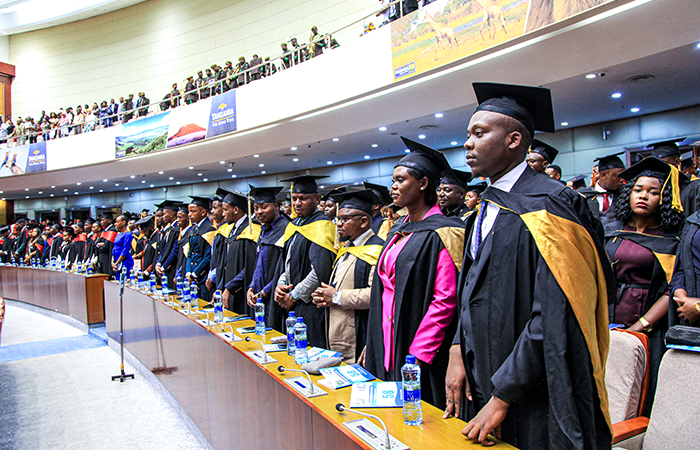
Graduation is a monumental achievement for students in Tanzania, signifying the culmination of years of hard work, dedication, and perseverance. However, understanding the specific requirements students must meet to graduate is crucial for academic success.
Whether at the primary, secondary, or higher education level, each stage of education has unique benchmarks. This guide breaks down these requirements, ensuring students, parents, and educators are well-informed.
Understanding Graduation Requirements in Tanzania
In Tanzania, graduation requirements are set by the Ministry of Education, Science, and Technology, along with other regulatory bodies like NECTA (National Examinations Council of Tanzania) and TCU (Tanzania Commission for Universities).
These requirements are designed to ensure students are academically, socially, and practically prepared for the next phase of their lives.
Primary School Graduation Requirements
Graduating from primary school is a significant milestone for Tanzanian students. Here’s what it takes:
- Passing the Standard Seven National Examination (PSLE):
- This exam evaluates a student’s knowledge in key subjects, including mathematics, English, Kiswahili, science, and social studies.
- A passing score is essential for progression to secondary school.
- Meeting Attendance Standards:
- Students must attend a minimum percentage of school days to qualify for graduation.
- Adhering to School Rules and Conduct:
- Good behavior and discipline are often mandatory for graduation eligibility.
Secondary School Graduation Requirements
Secondary education in Tanzania is divided into two stages: Ordinary Level (O-Level) and Advanced Level (A-Level). Each has its own graduation criteria.
O-Level Graduation (Form Four)
- Passing the Form Four National Examination:
- Administered by NECTA, this exam is a critical determinant of a student’s ability to proceed to A-Level or vocational training.
- Core subjects like mathematics, English, and Kiswahili must be passed.
- Satisfying Continuous Assessment Criteria:
- Coursework and internal assessments contribute to the final grade.
- Participation in Extracurricular Activities:
- Schools encourage involvement in clubs, sports, and community service, which may influence graduation eligibility.
A-Level Graduation (Form Six)
- Passing the Form Six National Examination:
- Success in this examination is crucial for university admission.
- Students must excel in their chosen subject combinations.
- Completing Community Service:
- Many schools integrate community service into their curriculum as a graduation requirement.
- Maintaining Good Academic and Behavioral Standing:
- Consistent performance and adherence to school regulations are essential.
Higher Education Graduation Requirements
Graduating from universities or colleges in Tanzania involves fulfilling rigorous academic and practical requirements:
- Completing Academic Credits:
- Students must meet the credit requirements outlined in their course of study.
- Submitting a dissertation or final project
- Research-based programs require students to complete and defend a dissertation.
- Fulfilling internship or practical training obligations
- Fields like medicine, engineering, and education mandate practical training or internships.
- Clearing FfinancialOobligations
- Tuition and other fees must be paid in full before graduation.
Special Considerations for Graduation
National Service Program (JKT):
For some graduates, particularly A-Level completers, participation in the National Service Program (Jeshi la Kujenga TTaifa—JKT) is encouraged. While not mandatory for all, it instills discipline and patriotism.
Inclusive Education for Students with Disabilities:
Tanzania is committed to inclusivity, offering tailored support to ensure students with disabilities meet graduation requirements.
Challenges Students Face in Meeting Graduation Requirements
While many students successfully meet graduation conditions, challenges persist:
- Financial Constraints:
- Lack of funds for tuition and materials can hinder progress.
- Limited Resources:
- Rural schools may lack adequate facilities and qualified teachers.
- Language Barriers:
- Transitioning from Kiswahili to English as the medium of instruction can be difficult for some students.
Efforts by the government and NGOs aim to address these challenges through scholarships, infrastructure development, and teacher training programs.
Why Graduation Requirements Matter
Graduation requirements ensure students are well-prepared for future academic and professional pursuits. They uphold the quality of education and foster a sense of achievement and readiness among students.
Conclusion
Graduation is a defining moment in the academic journey of Tanzanian students. Understanding and meeting the requirements for each level of education are crucial steps toward success. From excelling in national exams to completing internships and maintaining good conduct, these conditions shape students into capable and responsible individuals.
Stay informed, work hard, and embrace the opportunities that education in Tanzania provides. Graduation is not just an endpoint; it’s the beginning of a brighter future.
Related articles
- Discover Tanzania University Semester Two Exam Timetable Today
- 10 Proven Strategies to Ace Your Semester One Exams in Tanzania
- The Ultimate Guide to Scoring High in Semester One Exams at Tanzanian Universities
- Semester One Exam Schedule for Tanzanian Universities: Key Dates and Updates
- UDSM Announces Research Scholarships for Climate-Smart Agriculture
- Ministry of Education Denies Changes to Kenya’s University Entry Requirements
- Prof. Carolyne Nombo Opens Key Stakeholders Meeting on Teacher Education
- UDSM-Sida Re-advertises PhD Sponsorship in Marine Sciences
- How Companies in Tanzania Empower Education Through Scholarship Sponsorships


